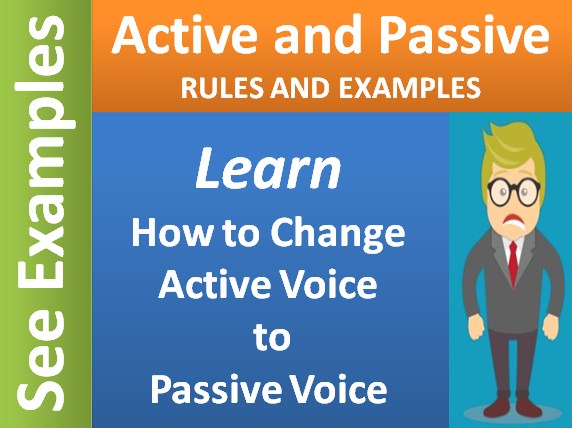Today you’re going to see various types of sentences in English that you need to know.
So let’s get started.
What is a sentence?
A sentence is a group of words that has a complete sense and tense.
A sentence, whether short or long, must express a complete idea.
And a complete sentence must consist of at least one independent clause.
That is, a subject and predicate that make a complete thought.
Made in India is correct English
But it is not a sentence because it doesn’t have a subject.
My car was made in India is a complete English sentence with a subject and a verb.
Sentences in English
Here are the types of sentences that I’ll discuss one by one in this post.
The purpose of a sentence also determines its classification.
There are four major types of sentences in English by purpose.
Declarative Sentence
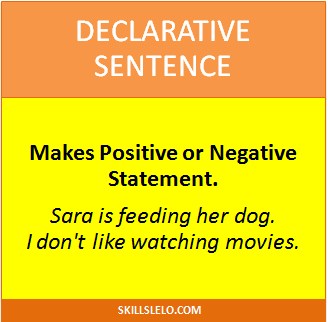
A declarative sentence makes a statement. The statement can be positive or negative.
Here are some declarative sentence examples;
The children are swimming.
Sara is feeding her dog.
I don’t like watching movies.
Interrogative sentence
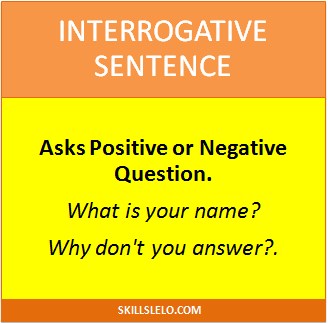
An interrogative sentence asks a question. The question can be positive or negative.
Some examples of the interrogative sentence are;
Was my name on the list?
Were you angry at Susan?
Was the recipe easy?
What’s wrong with you?
What is the problem?
Why are you afraid?
Why are you here?
There are two kinds of Interrogative sentences;
- Direct question
- Indirect question
We use question words i.e. what, why, how, etc in interrogative sentences to ask direct questions.
Some examples of direct question sentences are;
What is Sara doing?
What is your name?
Why don’t you come to my house.?
Why don’t you answer?
We use indirect questions to ask for information in a more polite way.
After the introductory phrase, use the affirmative form, not the question form.
Some examples of indirect question sentences are;
Tell me what you want.
Do you know where she was going?
He asked when was I leaving.
Exclamatory sentence
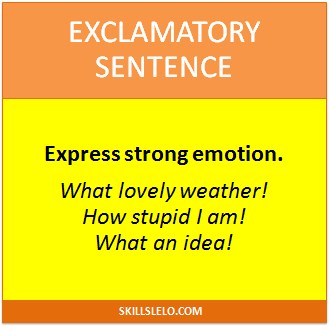
An exclamatory sentence express strong emotion.
What lovely weather!
How stupid I am!
What an idea!
What an interesting book!
Imperative sentence
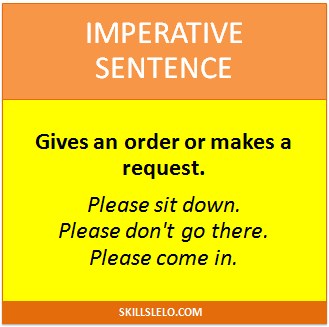
An imperative sentence gives an order or makes a request. It can be positive or negative.
Take a sandwich.
Please sit down.
Please don’t go there.
Please come in.
Open the door.
Voice is a grammatical feature that describes the relationship between the verb and the subject in a sentence.
There are two main types of voice: active voice and passive voice.
Active Voice Sentence
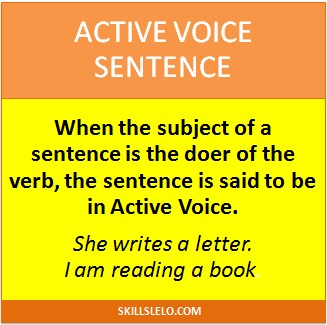
When the subject of a sentence is the doer of the verb, the verb is said to be in Active Voice.
Active voice is more common in speaking and writing.
For example;
She writes a letter.
I am reading a book.
In the active voice, the subject of a sentence is the doer of that sentence.
In the first sentence, the subject (she) is the doer of the verb (writes).
And in the second sentence, the subject (I) is the doer of the verb (reading).
The active voice is the most common type of voice in both spoken and written English.
And It is generally considered to be the default voice.
Passive Voice Sentence
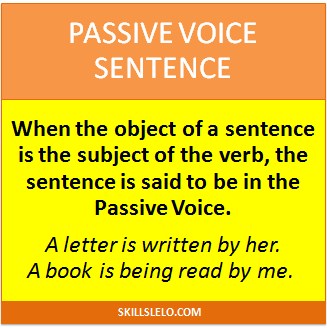
When the object of a sentence is the subject of the verb, the verb is said to be in the passive voice.
A letter is written by her.
A book is being read by me.
Passive-voice sentences are structurally opposite to active-voice sentences, with the object (now the subject of the sentence) coming before the verb and the verb coming before the agent of the action.
English sentences classified by structure include:
- Simple Sentences
- Compound Sentences
- Complex Sentences
Simple Sentence
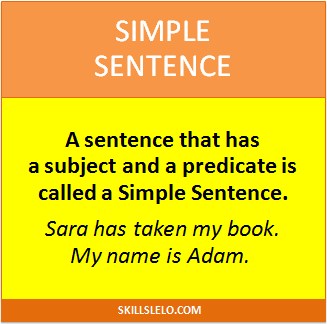
A sentence that has a subject and a predicate is called a Simple Sentence.
Sara has taken my book.
My name is Adam.
I met him in a park.
Compound Sentence
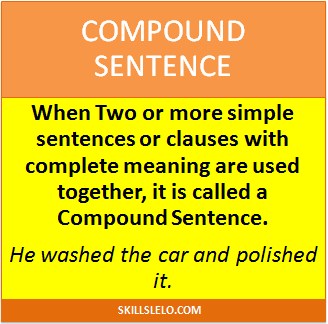
When Two or more simple sentences or clauses with complete meaning are used together, it is called a Compound Sentence.
The sentences or clauses are joined by coordinating conjunctions.
Coordinating conjunctions are ‘and, and then, but, so, for, etc.
He washed the car and polished it.
They sold their house, but they can’t help regretting it.
He could not his pen, so he wrote in pencil.
Complex Sentence
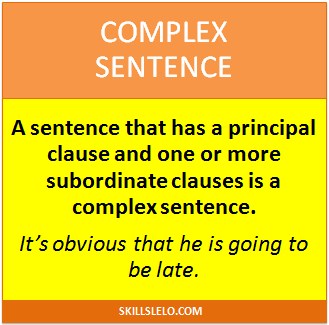
A sentence that has a principal clause and one or more subordinate clauses is a complex sentence.
The Principal clause and subordinates clauses are joined by conjunctions ie. after, when, since, that, etc.
It’s obvious that he is going to be late.
I had met her before she was married.
He went out after he had discussed it.
He sold the necklace which belonged to his mother.
She explained why he was wounded.
Simple Present Sentence
The present simple tense (also called the simple present) is used to express habits, facts, and timetables.
You are smart.
He is my friend.
She is not tall.
We are not tired.
They have a new car
We do not have milk.
I need a new computer
Simple Past Sentence
We use the past simple tense to express finished actions. It is often used with an expression of past time to give more complete information.
He was funny.
She was at work.
It wasn’t true.
Thomas answered the phone.
My brother joined the army.
Simple Future Sentence
The government will reduce taxes next year.
My mother will make a cherry pie.
He will declare bankruptcy.
John will trim his sideburns.
Present Continuous Sentence
We use the present continuous tense to speak about actions that are currently happening.
The present continuous tense is also called the present progressive tense.
To make the present progressive sentence, use be + present participle.
It can only be used with action verbs.
The wolf is howling at the moon.
They are crossing the lake in a canoe.
She is pouring a soft drink for you.
The nuns are sewing clothes.
It can also be used to describe actions or events that are planned for the future.
We are watching a movie later.
Past Continuous Sentence
The past continuous tense is used to describe something that was in progress at a certain moment in the past.
To form the past continuous sentence;
Use subject + were + present participle.
You were putting the memo on the bulletin board.
We were wearing our raincoats.
If the subject is a singular pronoun, replace were with was.
He was reading the label on the can.
I was talking to my boss in his office.
Future Continuous Sentence
The future progressive tense expresses an action that will be in progress in the future.
To make the future progressive sentence, use will be + present participle.
He will be scolding her.
She will be witting a story.
They will be preparing for a test.
John will be playing cricket.
Present Perfect Sentence
The present perfect tense is used when the time of past activity is not important or is not known in the sentence.
The present perfect tells us about something that occurred at some indefinite period in the past.
To form the Present perfect sentence;
Use have + past participle
They have borrowed a lot of money from their friends.
You have offended everybody in the office.
I have heard that noise in my car several times.
I have brought enough for everybody.
If the subject is third-person singular pronouns, replace have with has.
She has taught English in many different schools.
My dog has chewed all the furniture.
Past Perfect Sentence
The past perfect tense expresses the action that occurred before another action in the past.
To form the past perfect sentence;
Use had+ past participle
Use the past perfect with for, since, before, ever, never, once, twice, already, yet, so far, by then, just, finally.
Use the past perfect with the first event. Use the past
tense with the later event.
He had held a baby before today.
It had arrived, so I called the store.
I had noticed that you were standing there.
She had paid the phone bill, so I paid for it.
Future Perfect Sentence
The future perfect tense is used to express an action that will be finished at a specific time in the future.
To form the future perfect sentence;
Use will have + past participle + by + a specific date/a specific time/a specific event
Examples;
I will have finished my exams by June 1st.
We will have read the reports by ten o’clock.
She will have finished all the housework by lunchtime.
I will have taken my shower by the time you arrive.
They will have eaten supper by the time we arrive.
Present Perfect Continuous Sentence
Generally, we use the present perfect continuous to talk about that which began in the past and is still happening in the present.
The present perfect continuous tense is also called the present perfect progressive tense.
To form present perfect continuous tense, use the present tense of the auxiliary verb have along with been and the present participle (-ing form) of the “main” verb.
The present perfect continuous tense emphasizes the duration of action.
We usually specify the duration of time involved using for and since.
Use for (a length of time), since (an exact time).
Subject + have + been + Verb-ing + Object
For example:
I have been living in Delhi for three years.
I have been living in Delhi since 1988.
If the subject is third-person singular pronouns, replace have with has.
He has been living in Delhi for three years.
Past Perfect Continuous Sentence
We use the past perfect continuous tense to describe an action that began and was still in progress in the past before another past action started.
It also called the past perfect progressive tense.
The past perfect continuous emphasizes the continuous progress of an action.
To form the past perfect continuous, use had been + the present participle of the main verb.
Subject + had + been + Verb-ing + Object
For example:
I had been waiting for a long time when the train finally came.
I had been studying for five years before I started to work.
Future Perfect Continuous Sentence
The future perfect continuous tense expresses an action that will have been in progress for a certain length of time at a specific time in the future.
It is also known as the future perfect progressive tense.
Use subject + will have been + present participle to form the future perfect progressive tense.
Subject + will have + been + Verb-ing + Object
For example:
By the time I get there, she will have been waiting for over an hour.
By the time I go to bed, I will have been cooking for 2 hours.
